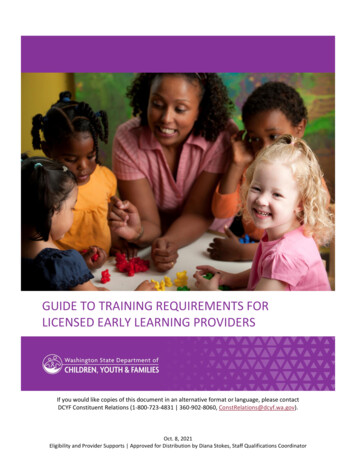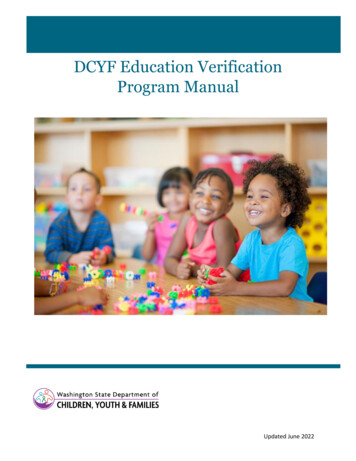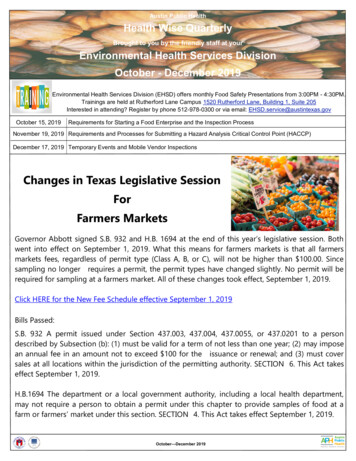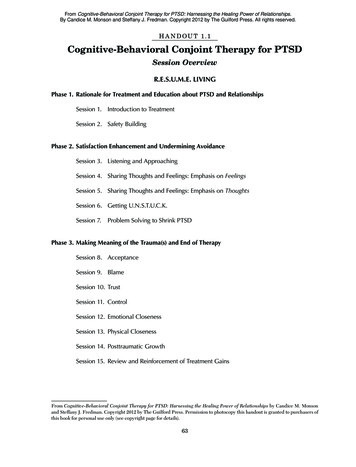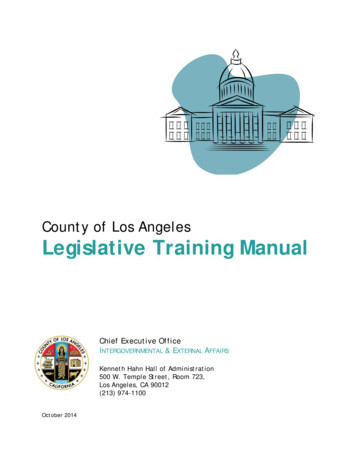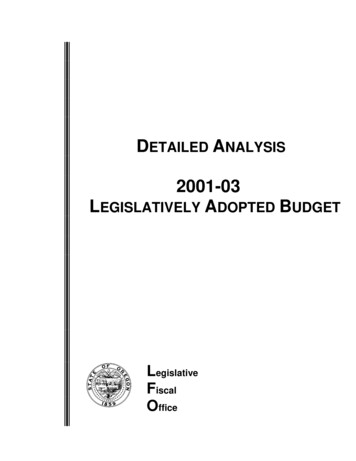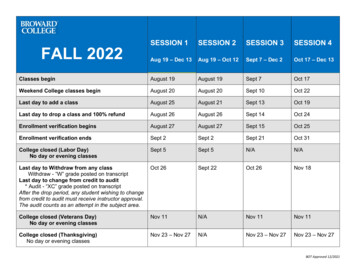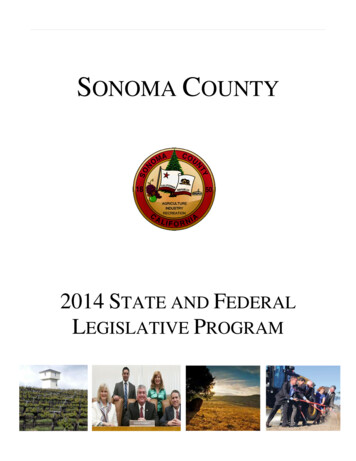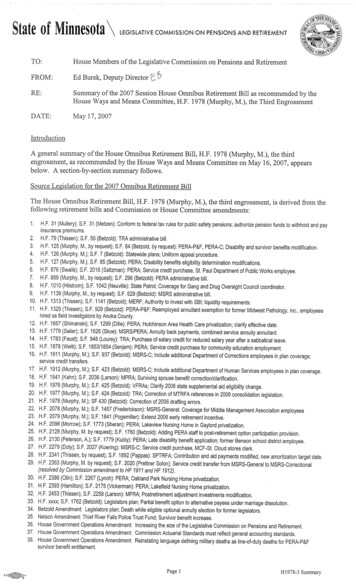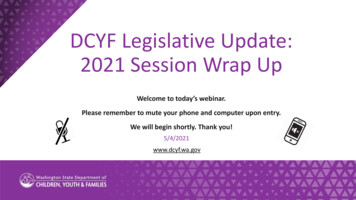
Transcription
DCYF Legislative Update:2021 Session Wrap UpWelcome to today’s webinar.Please remember to mute your phone and computer upon entry.We will begin shortly. Thank you!5/4/2021www.dcyf.wa.gov1
5/4/2021Agenda Session Updates – The Wrap Up Implementation – What to ExpectAllison Krutsinger, Government Affairs andJenny Heddin, Chief Financial Officer2
5/4/2021State Budget Timeline TextState AgenciesGovernor andOffice of FinancialManagement(OFM)JUN 1 2020Agencies submit reductionexercises to OFMSEPT 2020Agencies submit requestlegislation and budget proposalsJUNE-JULY, 2021Agencies submitdetailed spending plansJUN 17 2020RevenueforecastMAY 2020OFM issues budgetreduction exercisedirectionsNOV 2020Quarterly revenueand caseload forecastsFALL 2020OFM reviews state agency ARL andbudget proposals, Governor decidesDEC 2020Governor proposessupplemental budgetto LegislatureState LegislatureJAN 2020Legislature convenesJULY 1, 2021Biennialbudgettakes effectAPRIL/MAY 2021OFM reviews,Governor signs or vetoesAPRIL 2021Legislature passes budgetFEB/MARCH 2021Quarterly revenue andcaseload forecasts3
5/4/2021A Great Year for Children, Youth, and Families Expanded access to services for children, youth, andfamilies Investment in equity and doing things differently Strong partners (lawmakers, advocates, stakeholders)who believed in the agency, the staff, and the mission A reflection of trust in the agency to live into the mission A strong economy coupled with federal relief for states4
DCYF budget increases significantly despitereductions in caseload5/4/2021Final Budget 2,000,000,000 1,800,000,000 1,600,000,000 1,400,000,000 1,200,000,000 1,000,000,000 800,000,000 600,000,000 400,000,000 200,000,000 -Child Welfare 19- Child Welfare 21- Juvenile Justice Juvenile Justice212319-2321-23GFSEarly Learning19-21Early Learning Program Support Program Support21-2319-2121-23Other Funds5
5/4/2021Things to Keep in Mind Session concluded on April 25th, 2021 DCYF is still unpacking all elements of budget items and policy changes. Implementation conversations are just beginning – Creating shared understanding Determining internal leadership Developing project timelines6
5/4/2021Safely Reduce Number of Children in Out-of-Home CarePolicy and Budget HighlightsBill NumberHB 1194HB 1227SummaryStrengthening parent-child visitation during child welfare proceedings. Requires DCYF toarrange a family visit within 72 hours of receiving a child into custody, and establishes apresumption that visit supervision will no longer be necessary at certain stages of the case.Protecting the rights of families responding to allegations of abuse or neglect of a child.Increases the evidentiary standard for removing a child to imminent physical harm andrequires DCYF to take certain steps to prioritize placement with relatives or suitable persons.7
5/4/2021Safely Reduce Number of Children in Out-of-Home CarePolicy and Budget HighlightsFinal BudgetFFPSA Plan Implementation – authority to implement the FFTA grant. 5.8 MWendy’s Wonderful Kids – ongoing funding is provided to DCYF to facilitate placement oflegally-free youth through adoption in partnership with Dave Thomas Foundation. 1.2 MConcrete Goods and Services – support for children and families at risk of impacted byCOVID-19 through CBO partnerships and direct family grants. 9.5 MCommunity Prevention Pilot – funding is provided to contract with a non-profit providerwith expertise in a prevention pilot, in Pierce Co, to prevent child abuse and neglect. 1.7 MFamily Connections Program – ongoing funding is provided to implement HB 2525 (2020)the Family Connections Program. 1.3 M8
5/4/2021Create Successful Transitions to AdulthoodPolicy and Budget HighlightsBill NumberHB 1061HB 1295SB 5118HB 1186SummaryConcerning youth eligible for developmental disability services who are expected to exit thechild welfare system. Requires additional cross agency shared planning meeting at age 16.5 foryouth with developmental disabilities likely to age out of foster care.Providing public education to youth in or released from institutional education facilities.Continues the work of the Institutional Education Task Force to make recommendations onhow to improve institutional ed. OSPI is the lead agency, DCYF works in partnership.Supporting Successful Reentry. Implements many elements related to reentry including healthcare notification, and community facility citing.Establishing the Community Transitions Service Program. DCYF establishes a least restrictiveoption for young people serving under the agency care and custody that allows the obligationto be served in their own community with wrap around and therapeutic supports.9
5/4/2021Create Successful Transitions to AdulthoodPolicy and Budget HighlightsFinal BudgetYV LifeSet – contract with a community based provider to offer YV LifeSet. 1.1 MCommunity Reentry for All JR Youth – funding provided to increase efforts around leastrestrictive environment and supporting transitions. Funding includes: staffing in CF’s,supports for young people exiting care, complete the risk assessment tool includingvalidation. 9.5 MTeam Child Project – funding is provided to increase legal advocacy for young people. 1.3 MYouth Development Workgroup - Convene a workgroup to assess and providerecommendations for creating new infrastructure and funding streams that support youthdevelopment. 130kJR to 25 – Funding is provided to implement HB 1646 (2019) including staffing, programingand legal sentence review. 3.25 MTransitions from Care and Independent Living – one-time funding for DCYF to create andimplement a new approach to transition planning & independent living programs (7 FTE). 1.9 M10
5/4/2021Create a High-Quality, Integrated B-8 SystemBill NumberSB 5151SB 5237Policy and Budget HighlightsSummaryConcerning foster care and child care licensing by the department of children, youth, andfamilies. New work primarily focused on implementing child specific licenses. Adds outdoornature based early learning to law.Fair Start For Kids Act – concerning early care and education. Expansion of services andincrease to rates in WCCC and ECEAP; increases to other EL services like HV, ECLIPSE, and playand learn groups; expansion of scope of ELAC; increase in licensing technical assistance;creation of numerous grants and rate enhancement programs; increase in data andaccountability reports.Indian Child Definition – in partnership with Tribal partners establish a definition of Indianchild for ECEAP entitlement.Family Child Care licensing minimums – directs DCYF to offer child care licensing waivers toFCC to serve over 12 children when certain conditions are met.11
5/4/2021Create a High-Quality, Integrated B-8 SystemPolicy and Budget HighlightsFinal BudgetECEAP Slot Expansion – 500 slots in FY 22 and 750 slots in FY 23 (totaling 15,912 slots atthe end of the biennium). 25 MECEAP Entitlement and Integration - Funding is provided to develop a plan to achievestatewide ECEAP entitlement and to continue collaboration with the Office of theSuperintendent of Public Instruction to complete a report with options andrecommendations to align all high-quality early learning programs administered by bothagencies for the purpose of integrated classes. 1.01 MECEAP Entitlement – delayed ECEAP entitlement to FY 2027, the 26/27 school year. Addsnew populations eligible for ECEAP entailment.( 58 M)Summer ECEAP Funding – one time funding is provided for ECEAP services for 468 slots w/delayed start dates. 900k12
5/4/2021Create a High-Quality, Integrated B-8 SystemPolicy and Budget HighlightsFinal BudgetWCCC Eligibility Expansion – expands access to families at or below 60% SMI effectiveOctober 1, 2021. 17.4 MWCCC Student Parents Expansion – expands the definition for some student parentsexempt from the work requirement. 8.8 MWCCC Copayment Structure - co-payment is capped at 115 for the 21-23 biennium thenchanges in FY 23 to a new schedule. 76.7 M13
5/4/2021Create a High-Quality, Integrated B-8 SystemPolicy and Budget HighlightsFinal BudgetFamily Resource and Referral System – funding for the state-wide resource and referral. 530kExpand ECLIPSE – funding is provided to expand ECLIPSE services, directs geographicexpansion and encouraged Department referrals. 5 MEmployer supported care – funding is provided to implement the employer supportedchild care sections of Fair Start. Department of Commerce is the primary lead of the work,DCYF is a partner. 830kOrganizational CC Licenses Pilot – funding is provide for DCYF to implement a pilot projectto establish a multi-site child care license. 414k14
5/4/2021Create a High-Quality, Integrated B-8 SystemPolicy and Budget HighlightsFinal BudgetHome Visiting Expansion – expansion in FY 22 and FY 23. New proviso to include reportingrequirements and timeline for contract execution. 8 MFamily Child Care CBA – implement the funded CBA. 6.4 MPlay and Learn Groups – funding is provided for culturally and linguistically facilitated playand learn groups for family, friend, and neighbor caregivers for young children. 860kEarly ECEAP Expansion – funding is provided to expand access to early ECEAP. 3.8 M15
Improve Quality and Availability of Provider ServicesPolicy and Budget HighlightsFinal BudgetComplex Needs Funds – funding for two complex needs funds for providers to promoteinclusive, least restrictive environments and support individual child needs. One fund is forECEAP and Early ECEAP providers and one fund is for child care providers. 9.6 MTrauma Informed Care Supports – funding provided to develop and support approaches totrauma informed care by early learning providers. 2.8 MDual Language Rate Enhancement – funding provided to establish and implement a duallanguage rate enhancement for early learning providers offering bilingual instruction. Rateeffective July 1, 2022. 3.38 MEquity Grants – funding provided to establish and implement an equity grant program tosupport inclusive, culturally and linguistically specific early learning. 5.3 MProfessional Development – funding for scholarships, EA pathways, and other PD supportsfor child care providers. Funds may be contracted out to nonprofit organizations who offerrelationship based PD for FFN, FCC or center based providers. 8 M5/4/202116
Improve Quality and Availability of Provider ServicesPolicy and Budget HighlightsFinal BudgetChild Placing Agency Rate Increase (7.5%) – effective July 1, 2021. 923 KECEAP Rate increase – 10% rate increase effective July 1 2021 and annual inflationaryadjustments. 30 MWCCC Provider Rate Increase – increases rates to the 85th percentile July 1, 2021. 116.8 MInfant Rate Enhancement – 5% rate increase for infant care. 2.52 MMental Health Consultation – funding is provided to expand the Infant and Early ChildhoodMental Health consultation supports for child care providers by adding six consultants and 2.4 Mone coordinator.5/4/202117
5/4/2021Improve Quality and Intention of PracticePolicy and Budget HighlightsBill NumberHB 1061HB 1194SB 5151SummaryConcerning youth eligible for developmental disability services who are expected to exit thechild welfare system. Requires additional cross agency shared planning meeting at age 16.5 foryouth with developmental disabilities likely to age out of foster care.Strengthening parent-child visitation during child welfare proceedings. Requires DCYF toarrange a family visit within 72 hours of receiving a child into custody, and establishes apresumption that visit supervision will no longer be necessary at certain stages of the case.Concerning foster care and child care licensing by the department of children, youth, andfamilies. New work primarily focused on implementing child specific licenses. Adds outdoornature based early learning to law.18
5/4/2021Improve Quality and Intention of PracticePolicy and Budget HighlightsFinal BudgetTechnical Assistance for facilities fund – funding is provide for DCYF to provide technicalassistance to early learning providers accessing the early learning facilities fund. 956kData Dashboards – one time funding for public-facing data tools DCYF will use to trackequity goals and outcomes as part of early learning investments. 300kELAC and Oversight (incl. subgroup) – expands ELAC’s membership and role, establishesnew reporting requirements for Fair Start implementation, establishes a temporary subgroup to develop model policy for licensing and make recommendations for incentivizingnew child care. 543kProcess for Supporting Health Care Coverage for Child Care Providers – DCYF process toinform new child care staff of health coverage financial supports, and for DCYF to informHBE navigators of new child care staff for outreach and enrollment support. 40k19
5/4/2021Improve Quality and Intention of PracticePolicy and Budget HighlightsFinal BudgetLanguage Access Planning - DCYF to develop Language Access plan to address equity forimmigrant, multilingual providers, caregivers, and families. 250kCaseworker Caseload Ratios - 119 new FTE to support reduced caseloads. 11.5 MJR Behavioral Health – funding for substance use dependency professionals and DBTtherapy specialists to full implement SUD and DBT components of the Integrated Treatment 5.6 MModel.Implementation Costs – SSPS changes and Replacement. 22.5 M20
5/4/2021Other Policy Changes of NoteBill NumberHB 1219HB 1221HB 1237SB 5331SB 5184SummaryEstablishes the appointment of counsel for children and youth in dependency. Phased in overtime.Standardizes the definition of homelessness. Creates a consistent definition of homelessnessfor many programs and services.Family Resource Centers. Establishes and definition and framework for family resourcecenters.Early Childhood Court Programs. Establishes standards and a framework for early childhoodcourt programs. Requires certain activities and trainings for the court programs, andprofessionals involved.Establishes a building point of contact for in all K-12 public schools for students in foster care.21
5/4/2021Capital Budget – Juvenile RehabilitationProjectPurchase Touchstone Community FacilityFINAL Budget 800kGreen Hill School Recreation Building Replacement 29.96 MGreen Hill School Baker North Living Unit Remodel 6.6 MEcho Glen Acute Mental Health Unit re-appropriation 7 MMinor Works Re-appropriation 750kMinor Works Preservation 761k22
5/4/2021Capital Budget – Early LearningProjectCompetitive Grants to purchase, construct, or modernize facilities to addcapacity for WCCC and ECEAP – CommerceTechnical assistance for early learning facilities (4% of the above allocation) –DCYFGrants and loans to add capacity for WCCC and ECEAP – WELL FundGrants for minor renovations and small capital purchases and projects tosupport operations during and after COVID-19 emergency – Commerce WELLFundFINAL Budget 23,911,000 956k 7.5 M 10 M – COM 8.5 M – WELL FundGrants to school districts (funding of previous round of applicants) 4.719 MMember projects 1.08 MTotal Early Learning Facilities Grants and Loans Investment 55.719 M23
5/4/2021Authorized One Time Federal IncreasesGrantGrant Award AmountChild Care and Development Fund (CCDF) 477 MChild Care Stabilization Grant 391 MChaffee – Transition to Adulthood 8.7 MCommunity-Based Child Abuse Prevention (CBCAP) 5.6 MIndividuals with Disabilities Education Act (IDEA) 5.5 MChild Abuse Prevention and Treatment Act (CAPTA) 2.2 MTitle IVB 2.2 MEducation Training Voucher (ETV) 1.2 MMaternal, Infant, and Early Childhood Home Visiting (MIECHV) 3 MFMAP Increase (CCDF, Title IV-E, Title XIX)Entitlement – additional 6.2% federalearned on allowable expenditures24
5/4/2021Just Starting - Implementation Process 2021Implementation Scoping Meeting LogisticsGovernment Affairs will schedule and facilitate the first scoping meeting on each bill,proviso or like cluster of bills and provisos.Scoping meetings will occur between May 10th and May 28thWhat to expect for internal staff:Walk through of bill sections, key elements and deliverables to create sharedunderstanding on implementation planning.Identification of the following for the bill/bill sections: Who’s in charge Timeline Funding Rules and policy needs IT changes and updates Communications plans Stakeholder engagementDiscuss any unresolved concerns (legal or otherwise) that everyone needs to beaware of.Decide frequency of check-ins (if needed) and next steps.25
5/4/2021Implementation Meetingswill cover questions such as: What are major milestones mandated in the bill or arenecessitated by requirements of the bill? How may the funding be spent? Who are the internal and external audiences, what are the typesof information which need to be shared about theimplementation of the bill? What stakeholders need to be involved in the implementation,to what degree (informed, consulted, co-creators, etc.) andwho’s in charge of this work?26
Thank you!Contact:The Office of Government Affairs and Community Engagementdcyf.govaffairs@dcyf.wa.gov5/4/202127
Establishing theCommunity Transitions Service Program. DCYF establishes a least restrictive . - co-payment is capped at 115 for the 21-23 biennium then changes in FY 23 to a new schedule. 76.7 M. . ECEAP and Early ECEAP providers and one fund is for child care providers. 9.6 M. Trauma Informed Care Supports

